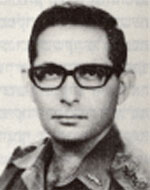Kedar (Koleski), Uriel
Uriel, son of Rosa and Leon, was born on January 8, 1936 in Cairo, Egypt, and immigrated to Israel with his family in 1950. He began his studies at the French school in Cairo and after his family arrived in Israel and settled in Tel- Aviv, Uriel was drafted into the IDF in the middle of August 1955. After completing his studies in the IDF, he was appointed to the Artillery Corps in 1956. In 1956, he completed a basic officers’ course and an artillery officer’s course and was appointed commander of a battery in an artillery battalion. Where he served as a guide and after completing his compulsory service he completed his military service in the IDF and volunteered to serve in the regular army. In 1964 he was transferred to the Israel Defense Forces, where he worked in research and development, and during an emergency served as an artillery officer, during which he was a partner in the development of new and sophisticated weapons. For trips abroad to study various subjects in his fields of work. He also took courses in electronic computers and expanded his education in mathematics when he studied at the Faculty of Exact Sciences at Tel Aviv University. As part of his position in the Signal Corps he was promoted to Major. He married his girlfriend Yehudit and set up his home in Tel Aviv, where his daughter Michal was born. He later divorced and married Sufiya and their daughter Ruth and son Ehud were born. Uri was a devoted and loving head of a family, and together with his wife, he established a home that was filled with love and friendship. In 1971 he returned to the Artillery Corps and was appointed R & D officer at the headquarters of the Chief Artillery Officer and promoted to lieutenant colonel. He was responsible for the development of electronic means, which helped to fight the artillery. During this period he was accompanied by an artillery officer, Brigadier General Aryeh Levy, during a tour abroad and advised him in areas related to the development of weaponry.In addition to his scientific work, he undertook to establish an artillery battalion. Was evaluated by his commanders as an excellent officer with a great deal of professional knowledge, who worked hard on research and development, and in all his accomplishments he excelled as a man of initiative, organization and management, and as a cool leader, The unit under his command participated in the battle against the Syrians at Ramat Hag Estate and then sent to Sinai to participate in battles and managed to breakthrough the Suez Canal. On twenty-two generosity of(18 October 1973), Uri was hit and killed in the shelling, he was brought to eternal rest in the Kiryat Shaul cemetery and left behind a wife, two daughters, a son and a mother.
